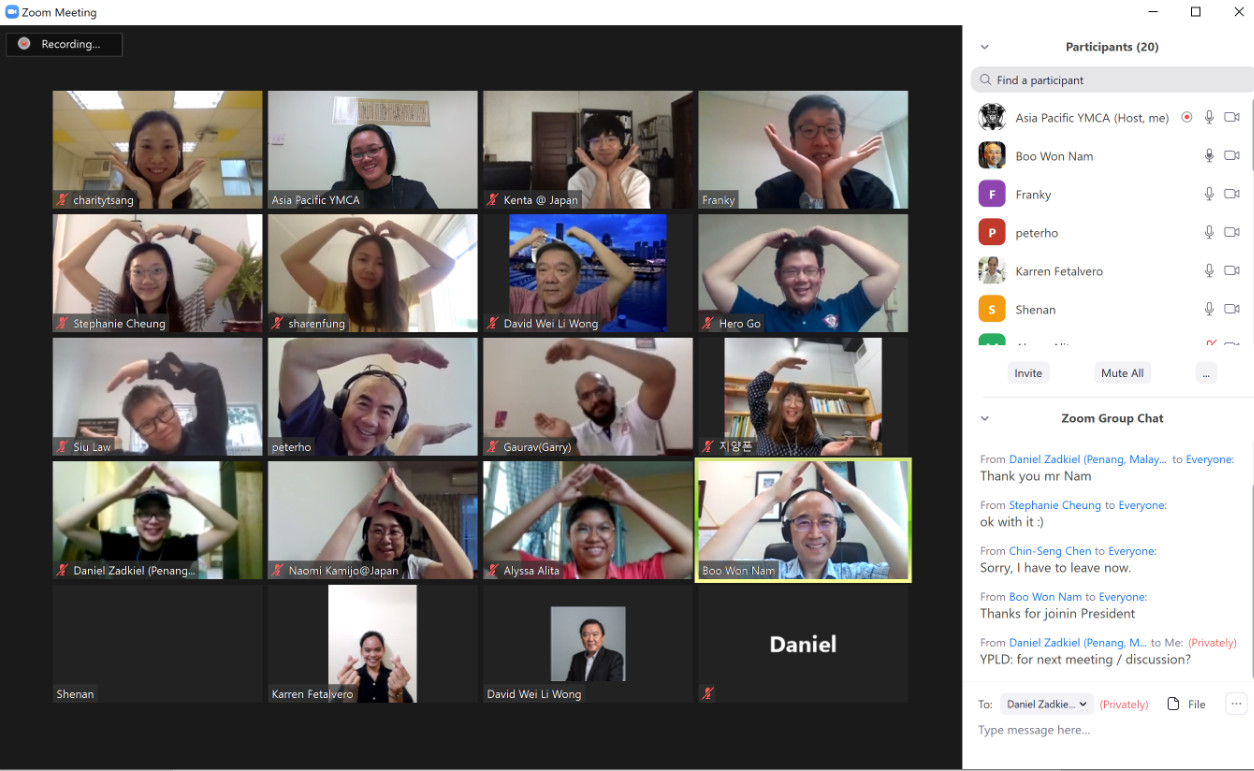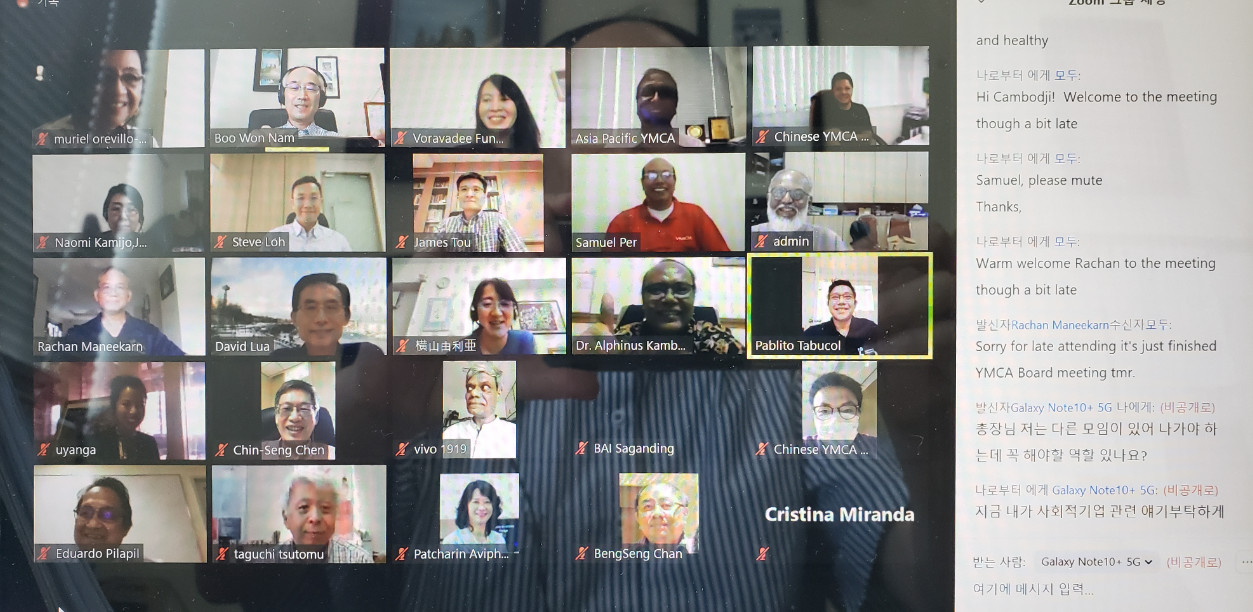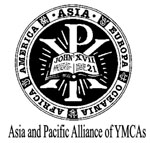|

1. APAY Executive Committee Meeting on 2nd and 3rd July, from 3:00 pm to 5:00 pm (Hong Kong Time) respectively
2. Committee on Gender Equity and Youth Participation & Leadership Development holds its First Virtual Meeting
3. Meeting of the Committee on Constitutional Matters and Mission & Response
4. A theological reflection on Covid-19 pandemic
|
|

|
|
APAY Executive Committee Meeting will be held through Zoom on 2nd and 3rd July, from 3:00 pm to 5:00 pm (Hong Kong Time) respectively
Due to the Covid-19 pandemic unabated and prolonged, the Executive Committee Meeting of the APAY will be held, by the decision of the APAY Board, by online video conference (Zoom) on Thursday, 2nd July and Friday, 3rd July 2020 from 3:00 pm to 5:00 pm (Hong Kong time) respectively.
We expect that all members of the APAY Board, National Presidents and other Executive Committee Members, National General Secretaries and the members of various standing committees will be participating at the Executive Committee Meeting through Zoom. The ECM, as held in a limited time compared to previous in-person meetings, will have reduced agendas including the following:
- Mission Review: Post-Covid19 World and YMCA Response
- In Memoriam
- Confirmation of the Minutes of the 2019 Executive Committee meeting
- Adoption of new Standing Committee and Task Force members
- Quadrennial Program Report
- Reports and adoption of the standing committee minutes
- Adoption of the QPP 2020~2023
As requested earlier through the circular, all the ECM members, NGSs and Standing Committee members are kindly required to register their participation through Google Registration Form attached to the circular by June 20, the latest. Then the APAY office will send the Zoom link to each participant separately for their connection to the virtual meeting on 2nd and 3rd July.
Also as informed earlier, all the Standing Committees of APAY will complete their first committee meetings before the ECM and get ready for reporting of the minutes. Some of the standing committees have already met by Zoom as you could see the outcomes of the meetings in the following articles.
APAY hope that all our leaders will understand the reason for holding the Executive Committee Meeting and Standing Committee meetings in such a limited fashion, as we are committed to continuing to work on fulfilling our mission, even during this time of the pandemic. The greater crisis we face, the more solidary and mutual support are called upon as the YMCA Bible passage reminds us, “that they all may be one”!
|
|
Committees on Gender Equity and Youth Participation & Leadership Development holds its First Virtual Meeting
The Standing Committees of Asia and Pacific Alliance of YMCAs namely Committees on Gender Equity; and Youth Participation and Leadership Development (YPLD) held its first virtual meeting last 27 and 28 May 2020, respectively. The online meeting was organized to connect with colleagues and friends in the region who are members and/or invitees of the said committees despite limitations for a face-to-face meeting due to the global health crisis on COVID19. This virtual connection served as a platform to continuously plan for activities related to APAY program thrusts on gender justice and youth empowerment. Participants of both committee meetings engaged actively in the discussion on how to move forward with the common vision and the program plans for 2020-2023 that translate the 20th General Assembly Mandate. The committee also adopted its terms of reference which describes the purpose of the committee and the tasks to be done.
The Committee on Gender Equity, that was led by Nagako Okado, APAY Board Member and immediate past Committee on Gender Equity Chair, expressed in its terms of reference the commitment for gender equity and women empowerment as core of the YMCA mission. It also affirms the quest for elimination of discrimination and promotion of an inclusive society through collaborative undertaking. It further stresses the need to develop policies and mechanism that eliminates gender inequalities and injustices. It is recognized that the call for gender equity and women empowerment is not a separate work of, for and by women and other sexual minorities. Rather, it is a cross-cutting agenda that contributes to the sustainable development of communities and, at the same time, sustains the life and work of the YMCA as a socially relevant movement.
The Committee will therefore focus on:
- Advancing the APAY Gender policy guidelines and strategies for gender sensitivity and gender responsive programs at all levels within the region.
- Increasing leadership skills and capacity development for women empowerment and gender equality through sub-regional leadership formation/training.
- Cultivating the culture/sense of gender equity and empowerment of women and girls at all levels through creation of platforms of learning, reflection, and exchanges of experiences.
- Enhancing advocacy capacities of various constituents that promote policy and programming reforms for equal opportunities for all gender at all levels.
- Encouraging constitutional change at local and national levels to facilitate women membership and leadership in Local and National Boards.
- Organizing and mobilization of national/local movements to engage in community-based gender justice and women empowerment projects.
- Networking with the World Alliance and other NGOs for the development of gender justice programs.
- Monitoring and evaluating the outcomes of gender justice strategies annually and post quadrennial period.
On a similar note, the Committee on Youth Participation and Leadership Development in its terms of reference reiterated the call on each YMCA in the region to empower all, especially young people, and women. As further described in the terms of reference, the YMCA movements in the region must recognize the importance of building the potentials of youth at all levels. This mission-oriented engagement encourages national movements to build strong youth participation and leadership development that leads to movement relevancy and social transformation. Thus, the APAY 20th General Assembly Mandate calls for a regional commitment on providing education, awareness raising and capacity/skills building programs for young people on social issues and leadership development. Similarly, these initiatives strengthen the national movement’s commitment to support sustainable mechanisms for greater youth involvement in programming and decision-making at all levels.

The Committee will specifically focus on:
- Increased and sustained participation and leadership of youth in standing committees and boards at all levels of the YMCA - Local, National, and Regional.
- Implementation of recommendations expressed in the APAY Youth Assembly and various YMCA youth forums/gatherings.
- Building leadership skills and organizing capacities of youth on mission relevance work in YMCA and in societies.
- Increasing knowledge and deepening understanding on social issues affecting students and youth through engagement in dialogue and sharing of experiences.
- Nurturing youth with a sense of responsibly to development of communities and eradication of injustices.
All matters that were decided will be reported to the Executive Committee Meetings which will likewise be held online on 2-3 July 2020. APAY expressed its appreciation to all attendees for their valuable discussion during the meeting.
~Maria Cristina L. Miranda, Executive Secretary for Programs
Meetings of the Committee on Constitutional Matters and the Mission & Response Committee
The standing committees of APAY have been formed along with the commencement of the new quadrennial of APAY. Due to the COVID19 pandemic and with travel restrictions enforced, the Executive Committee Meetings of APAY which was scheduled to be held during the first week of March 2020 could not be held. Now the meetings will be held on 2nd and 3rd July 2020. According to the convention, the standing committees meet before the ECM and the recommendations of the standing committees are presented at the ECM for adoption.
The meeting of the Committee on Constitutional Matters was held on Tuesday 2nd June 2020 at 3.00 pm online on Zoom platform. Chairperson of this committee, Advocate Joseph John from India chaired the meeting. For the time being, there were no such matters to deal with any amendments, except, the committee recommended incorporating provisions for accepting online meetings and electronic communications as legal in the APAY By-Laws. The members emphasized to prepare a checklist of minimum standards related to the governance of local and national YMCA movements. They also agreed to work on formulating the minimum requirements of a national constitution and draft a model constitution.

The meeting of the newly constituted Mission and Response Committee also met for the first time on Thursday 4th June 2020 at 3.00 pm on Zoom platform. A total number of 26 members and invitees including APAY staff joined the meeting. Fr. Philip Thomas from Malaysia chaired the meeting. Four program areas of APAY’s Quadrennial Program Plan for the present quadrennial were discussed at the meeting. These were (i) Christian Foundation and Social Relevance (ii) Environment & Climate Change (iii) Justice and Peace (iv) Economic Empowerment. The members discussed the feasibility of holding the programs in the event of the COVID19. The issue of resorting to alternative measures to materialize the planned programs was also discussed. In the area of economic empowerment, the need was underscored to engage youths in social entrepreneurship to address the issue of unemployment. Finally, the QPP was recommended for consideration at the Executive Committee Meeting.
~ Duncan Chowdhury, Executive Secretary for Programs
A theological reflection on Covid-19 pandemic:
How can we say "Peace, peace," when there is no peace?
In the context of the pandemic, how can we say “Peace, peace,” when there is no peace?” (Jer. 6:14) How can we say there is peace, when on June 2, 2020, the Worldometer recorded that there are 6.4 million people had been infected with the pathogen called “severe acute respiratory syndrome coronavirus 2” (SARS-CoV-2)? Is there peace when as June 2 alone, the current infected cases have reached 3.1 million, with serious or critical cases of 53,403, and 3 million people with mild infections, and 377,473 deaths? The SARS-CoV-2 is a new virus that emerged in late 2019 in China. In January, people were already in a panic mode, scrambling for surgical face masks, hand sanitizers, alcohol, and even toilet paper. Some were hoarding and even stole these items from the shops by bulk. Some leaders complacently denied the existence of the pathogen even as the numbers of death in different countries were rising steeply. The World Health Organization also took some time to act and it declared COVID-19 to have reached the pandemic level only on March 11, 2020. Then, the pandemic declaration has forced those who were in a denial state to wake up and when they did, they declared their territories to be locked down without preparing the people. The fears and frustrations were aggravated by the peddlers of fake news that mislead and distract the attention of people by spreading disinformation. They say that “COVID-19 is not a virus, that it is not real; that the pathogen is really a bacteria.” How can we say peace, when the truth is not revealed? How can we say peace when the revealed truth it is not recognized? In this instance, the prophet Ezekiel’s word is relevant when he said, “They have misled my people, saying, “peace,” when there is no peace” (Ezekiel 13:10).
Some countries mostly led by women, and a few good men, have carefully planned together with experts on how to respond to the crisis with transparency, informed by science, and on how to address the social, cultural, and economic impact of the pandemic. But these are rare and exceptional cases. In many cases, the leaders and citizens ignored the science of COVID-19. During the pandemic, unjust practices make unpeace complicated. The pandemic has surfaced many intertwining and complicated forms of injustices in the social, cultural, gender, race, economic, and political dimensions of people’s lives. The proclivity to racist and xenophobic attitudes emerged. In the Philippines, for example, women and those with mental health issues were vulnerable to physical and sexual abuse by those who managed the check-points. People of color in predominantly white countries experienced bullying and assault. Because of the territorial lockdown, health workers have to walk for hours to the hospitals because there was no public transportation available. Some of them were assaulted by those who misunderstood them as carriers of the coronavirus. We heard of complaints from health workers and other front-liners who did not access to adequate personal protective equipment. Some politicians demanded special treatment by having for the COVID-19 testing done in their homes. Those who are in high public office positions were condoned for violations of curfews and quarantine protocols by partying or going to the beach. And yet, the “law enforcers” easily mauled, imprisoned, and fined the lowly vendors who are trying to eke out a living. Civil society members who distributed goods to the poor, or who held feeding programs were arrested. People who expressed criticisms over irregularities in the policies and manner of giving support to those who lost their livelihood during the pandemic were arrested. Some countries refused to listen to the United Nation’s call to implement a ceasefire. Others continue to ravage the Earth through mining and other destructive activities. The killing of environmentalists continued. In some countries, due to short notice, people were caught unawares of the lockdowns – local or national, found themselves in a very difficult predicament. Migrant workers are in a quandary of where to go as countries of employment did not have safety nets ready for emergencies like the pandemic.
The litany of situations of injustices can go on and on. But the worst thing that happened and still going on is the wanton corruption displayed in these times. Politicians and officials, who are in positions supposedly to look after the welfare of the people, are using the pandemic as an occasion to amass political and economic power. These leaders are taking the pandemic as an opportunity to pass unjust laws to prop up an unjust structure that would allow them to consolidate their insatiable greed for power and wealth. Thus, it is not true that COVID-19 is an equalizer. It has even exposed the glaring disparity among the rich and the poor. It has made the poor and the vulnerable languish even more in poverty, hunger, loss of jobs, and homes. And so how can we say peace, when unjust structures are made even stronger in light of avarice?
Scientists tell us that the coronavirus will be with us for some time and that until vaccines are available, only the non-medical or non-pharmaceutical measures could contain the transmission chain. This means also that standard hygiene practices, washing of hands, social distancing, covering one’s mouth and nose when in crowded places, avoidance of gatherings will still be in place. Subsequently, people of faith are called to do something to ease the suffering of the people and the Earth. Jane Addams said, “Nothing could be worse than the fear that one had given up too soon, and left one unexpended effort that might have saved the world.” Equally important is for all of us to remember our moral obligation for the common good, especially in this pandemic situation. Remember the exhortation of the prophet: “He has told you, O mortal, what is good; and what does the Lord require of you but to do justice, and to love kindness, and to walk humbly with your God?”
The pandemic has brought to the fore the real nature and character of individuals, groups, and nations. It has also called upon the people of faith to put that faith into action. Charity is definitely necessary in these times, but the call to do justice, make right what is wrong, and to take a prophetic stance is even nobler. This is what Challenge 21 is all about. Ultimately, YMCA’s Challenge 21 is a call to work for durable peace, one that is anchored on justice. It is not a romantic call. It is a genuine call to be faithful to the good news of Jesus of Nazareth. Followers of Jesus are called to walk the way of justice and peace at all times, pandemic or no pandemic. We must take the ethics of truth-telling, transparency, caring, reciprocity, and solidarity as the foundations of justice. True peace is about the practice and presence of justice among non-human and human citizens of this Earth.
The peace activist and feminist Jane Addams rightly said that “true peace is not merely the absence of war, it is the presence of justice.” The prophets of old knew that justice is a pre-requisite to peace and thus called on the leaders especially to “let justice roll down like waters, and righteousness like an ever-flowing stream” (Amos 5:23). The challenge of unpeace that the pandemic has brought is great. But the greatest challenge is to face our accountability to God’s people and creation in situations of vicious and excessive injustices in times of public health crisis. When the pandemic is over and hopefully it will be soon, will we be able to say to ourselves, to one another, and God, “Peace, peace,” because we tried our best to work for justice?
~Muriel Orevillo-Montenegro, PhD., ICF Coordinator
|





